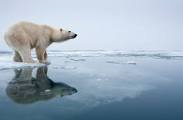There is a story I know. It is a story about how evil came into the world.
 One winter Bear’s mother sent him on a great chunk of ice to find a new place for fish. She looked at the moon to tell him a good place to go, but the moon forgot and Bear drifted for three moons through the sea. After the third moon the sun was telling the bear to stop being silly and waiting for the moon to tell him anything because the moon is always falling asleep. The sun decided to try to get Bear to stop his wandering by giving his chunk of ice back to the sea. Bear was very hungry and trying to put his four paws on the little ice and still waiting to know where he should go for fish. As the sea gobbled his ice he saw the fish swimming all around him laughing at seeing a big bear on a little piece of ice. Finally, Bear bumped into a tree along the shore of the great lake, and the tree shook Squirrel from a branch on to Bear’s head to tell him to stop here.
One winter Bear’s mother sent him on a great chunk of ice to find a new place for fish. She looked at the moon to tell him a good place to go, but the moon forgot and Bear drifted for three moons through the sea. After the third moon the sun was telling the bear to stop being silly and waiting for the moon to tell him anything because the moon is always falling asleep. The sun decided to try to get Bear to stop his wandering by giving his chunk of ice back to the sea. Bear was very hungry and trying to put his four paws on the little ice and still waiting to know where he should go for fish. As the sea gobbled his ice he saw the fish swimming all around him laughing at seeing a big bear on a little piece of ice. Finally, Bear bumped into a tree along the shore of the great lake, and the tree shook Squirrel from a branch on to Bear’s head to tell him to stop here.
Bear and Squirrel were soon running around together and were brothers, and everyone knew that they were the ones who played the tricks on humans and animals alike. When the humans were putting their fish to dry in the sun, Bear would lay very still in the water pretending that he was one his tree friends who were laying in the water to cool off and helping him hide. When the humans went to sing their songs to the moon, Bear would invite his friends to come and laugh at the fish and have a feast. When it was time to store nuts for the winter, Squirrel would throw a big party and ask everyone to bring him a nut. He wasn’t lazy, he just wanted to see all of his friends before the big winds and snow came.
One time Squirrel told all of his friends to join him for the party and make sure and bring their nuts. The snakes and the old men came, and so did the horses and the children. Squirrel was busy running up and down the tree putting the nuts in all of the best places in high branches as everyone arrived and gave him their nut gifts. Meanwhile Bear was eating all the berries and fish that he could find and was busy night and day and forgot about Squirrel’s party. The fish danced away from him in the water and laughed at Bear for forgetting about the party. Bear knew that he was very late and did not have time to find nuts in the moonlight, so the fish told him to bring some smooth round rocks from the river so that Squirrel would think they were nuts in the dark. Squirrel grabbed the rocks from Bear when he arrived and chattered away to him about coming to the party so late. As he ran up the tree the rocks felt very heavy and they fell from his paws and landed very hard right on the head of the Bear. The Bear was in such pain and so angry at his friend that he shook the tree very hard. The Squirrel landed right on the bump on his sore head. Bear was so angry that he took the squirrel in his hand and threw him and his nuts into the sky … where they remain today as a constellation and many bright stars in the sky, frozen and far away from Bear, who misses his mischievous friend Squirrel and wishes he would come back to the tree by the sea.
“But, of course, it was too late. For once a story is told, it cannot be called back. Once told, it is loose in the world. So, be careful of the stories you tell, and the stories you listen to” (King, 10).

ΩΩΩ ΩΩΩ
When I told this story to my daughter, she said that is not the way that she would tell the story. Although I obviously made up the story I felt a sense of disappointment that she was rejecting “my” story, for my story had become a part of me. She said that the story is silly. I found myself remembering what King said that the “sober voice in a Christian story …creates a sense of veracity” (King, 23). If a story is told with humour deemed silly by the listener does it also undermine the veracity for European readers?
Works Cited:
King, Thomas. The Truth About Stories: A Native Narrative. Peterbough:Anansi Press. 2003. Print.
Miller,W., Schuster,S.C., Welch,A.J., Ratan,A., Bedoya-Reina,O.C., Zhao,F., Kim,H.L., Burhans,R.C., Drautz,D.I., Wittekindt,N.E. et al. (2012) Polar and brown bear genomes reveal ancient admixture and demographic footprints of past climate change. Proceedings of the National Academy of Science U.S.A., 109, E2382–2390.
Van der Merwe, M. Brown, J. & Kotler, B. (2014) Quantifying the future value of cacheable food using fox squirrels (sciurus niger), Israel Journal of Ecology & Evolution, 60:1, 1-10, DOI: 10.1080/15659801.2014.907974

4 responses to “Assignment 1.4: “How Evil Came Into the World””